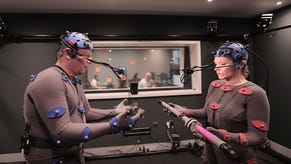27% of avid gamers planning to buy 3D TVs
CEA study suggests casual gamers are also curious about 3D consoles
There is significant interest in 3D gaming, even before the various revelations of E3, according to a new survey by the Consumer Electronics Association.
The results, collected during the last week of May, posit that 31 per cent of avid gamers intend to buy a 3D-capable console, and 27 per cent a 3D TV. Additionally, 25 per cent were planning on picking up a 3D handheld - the only option for which is, of course, Nintendo's 3DS.
Only seven per cent of self-identified casual gamers are planning on picking up a 3D-ready console within the next year, but on the other hand 35 per cent of all respondents claiming to be interested in 3D gaming were from the casual demographic.
"The introduction of 3D into the gaming arena has the potential to reinvigorate the gaming market by adding greater realism and fostering a more social gaming experience," said CEA's senior research analyst Ben Arnold. "As interest grows and consumers become more comfortable with the technology, 3D is poised to become the preferred format for many gamers."
Of the casual gamers, greatest obstacles to purchase were cost of the hardware, games and accessories, while 35 per cent of traditional gamers were worried about compatibility with 2D games, and 33 per cent about possible vision-related health problems.
This perhaps suggests that consumer understanding of 3D is relatively incomplete for the time being - that may have changed in the wake of Sony and Nintendo's 3D announcements at E3, but first-hand experiences will be necessary for many potential customers.
"Like with 3DTV, HDTV and other innovative technologies, consumers will need to experience a 3D video game to truly appreciate the experience,” said Arnold. "Manufacturers, retailers and game publishers will have to partner to offer more demonstrations and consumer education so prospective buyers can experience gameplay and other features of a 3D gaming device."
With 3D TVs currently sitting between £1400 and £3500, this relatively high interest is perhaps speculative for now, but it's good news nonetheless for Sony and its 3D partners.








